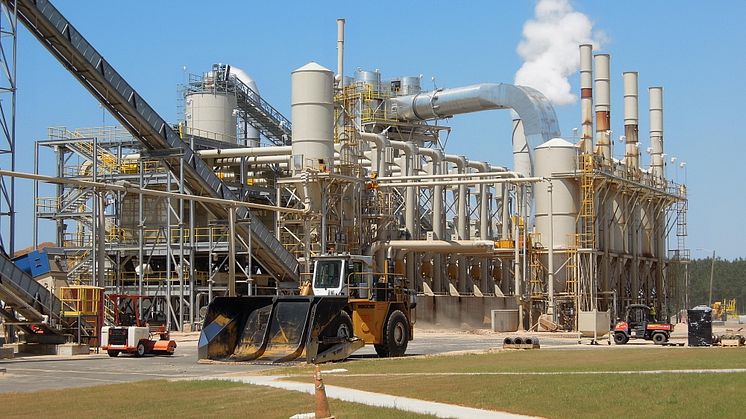
Pressmeddelande -
Nuanced impacts of a growing wood pellets industry on local US forests
Researchers in Sweden and the US studied systematic changes in timberland conditions of procurement areas of wood pellet mills in the Eastern US. Using the best available data spanning 12 years, they found a positive temporal trend of more carbon in live trees but fewer standing-dead trees associated with the operation of large-scale wood pellet mills. In procurement areas of wood pellet mills of the US coastal southeast - where US wood pellet exports to the EU originate - there appeared to be less carbon in soils. Overall, a net expansion in carbon pools is compliant with current trade requirements for the preservation of carbon stocks. However, localized forest impacts should continue to be monitored in order to assess long-term sustainability.
A new export-oriented wood pellet industry in the southeast coastal US has emerged within a landscape already influenced by other wood-using industries. The EU28 imported a total of 11.48 million tons of wood pellets in 2019 with the US as its top trading partner. From negligible volumes prior to implementation of the EU Renewable Energy Directive (EU RED) in 2009, the EU28 imported a total of 6.78 million tons of wood pellets from the US in 2019. In other parts of the eastern US, wood pelletization has grown to supply the domestic bioenergy market. Rapid growth in wood pellet manufacturing has raised concerns over potential detrimental impacts on forests.
Results from the systematic assessment of 125 procurement areas spanning 12 years tell European policy-makers and consumers that large-scale wood pellet production in the US has been associated with an expansion in carbon pools in live trees - which is compliant with current EU RED biofuel trade requirements for the preservation of carbon stocks in biomass sourcing areas. However, procurement areas of continuously operating wood pellet mills of the US coastal southeast and of large-scale capacity showed, respectively, lower carbon stocks in soils and a downward trend in the number of standing-dead trees.
Francisco X. Aguilar, Professor at the Swedish University of Agricultural Sciences (SLU) Department of Forest Economics, stresses how new market demand can yield greater levels of carbon in live trees. But also how more intensive land management practices - likely behind some of the inverse trends found - could negatively impact local forest conditions. “In this regard, recent developments to assure the sustainable sourcing of forest biomass are welcomed.”
He adds: “All-in-all our analysis suggests some positive areas but possible concerns if some trends were to continue. We examined 12 years of data, but that is only a small window of time to assess sustainable forestry. Monitoring using the best-available data shall continue. And it must be observant of other co-localized factors that can significantly alter forest conditions. For instance, systematic assessments must also take into consideration population changes, expansion in wood fibre demand from other competing sectors, and extreme weather.”
First-of-its-kind systematic assessment of the wood pellet industry and local timberland conditions
Using the most recently available data on localized timberland conditions from the Forest Inventory and Analysis Program of the USDA Forest Service, researchers at SLU, the University of Missouri, and Resources for the Future examined changes in timberland attributes denoting structure (e.g., number of live trees), and addressing concerns over impacts on wildlife habitat (e.g., number of standing-dead trees) and fluctuations in major carbon pools (e.g., carbon above and belowground in standing live and dead trees, and soils). Discernment of changes within procurement areas of the wood pellet industry between 2005 and 2017 took into consideration concurrent anthropogenic (e.g., other industries consuming wood fibres) and naturally-occurring factors (e.g. extreme weather). Until now, insights into EU RED related policy effects on US forests have been inferred from a review of the extant literature, case studies, and land use projections.
The full manuscript is available at: http://www.nature.com/articles/s41598-020-75403-z
For more information, please contact:
Francisco X. Aguilar, Professor
Department of Forest Economics, SLU, Francisco.aguilar@slu.se
Link: http://www.nature.com/articles/s41598-020-75403-z
Reference: Aguilar, F.X., Mirzaee, A., McGarvey, R., Shifley, S. & Burtraw, D. 2020. Expansion of US wood pellet industry points to positive trends but the need for continued monitoring. Scientific Reports.http://www.nature.com/articles/s41598-020-75403-z

